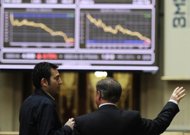Euro and stocks dive before eurozone meeting

Sentiment was also tense after Germany reasserted its stance against eurobonds -- whereby strong and weak eurozone countries would pool their ability to borrow -- despite calls from other members and the IMF to consider this option.
London's benchmark FTSE 100 index of top companies plunged 2.53 percent to 5,566.41 points, while in Frankfurt, the DAX 30 fell 2.33 percent to 6,285.75 points and in Paris the CAC 40 tumbled 2.62 percent to 3,003.27 points.
In Italy, the benchmark FTSE Mib index in Milan dove 3.68 percent and Madrid sank 3.31 percent to close at its lowest level since May 2003.
Meanwhile the European single currency dove to $1.2564 in afternoon trading, touching a low last seen on July 13, 2010. It later stood at $1.2576, down sharply from $1.2684 late in New York on Tuesday.
The dollar fell to 79.37 Japanese yen from 79.98 yen on Tuesday.
"Stock markets fell back sharply again on Wednesday and the euro came under further pressure as doubts grew that the evening's informal meeting of EU leaders in Brussels would do much to prevent an imminent exit of Greece from the eurozone," said John Higgins of Capital Economics.
"The ongoing decline in euro/dollar is mirroring the decline in the willingness of investors to carry any unnecessary risk," ETX Capital trader Markus Huber told AFP.
European Union leaders were to meet late on Wednesday in Brussels to discuss how to handle the Greek crisis, with eurozone countries admitting they are examining likely costs and possible complications arising from a potential exit for Greece.
"Investors are continuing to become even more risk averse than they have already been before, factoring in the notion that the EU summit won't be yielding much in a way of bringing calm into the financial markets at least in the short term, with turmoil continuing at least until mid June when elections in Greece are taking place," added Huber.
French President Francois Hollande stressed the importance of immediate action before the meeting.
"I say that we have to act straightaway for growth ... otherwise there will still be doubt on the markets," said Hollande.
With investors seeking refuge in the safe-haven assets, Germany's ten-year bond yield hit a new record low of 1.390 percent from 1.4 percent at Tuesday's close of trade.
Huber said markets were also reacting comments by an European Central Bank member "that no further stimulus measure or rate cuts are being planned at the moment, more or less saying that in the near term the markets are being left to their own devices and should not count on help from the ECB even if markets are continuing to go down."
David Morrison, an analyst at GFT trading group, said investors also "took fright" after the comments by former Greek Prime Minister Lucas Papademos, even if he later distanced himself from them.
Speaking to Dow Jones Newswires, Papademos said "it can not be excluded that preparations are being made to contain the potential consequences of a Greek euro exit."
He added that "the risk of Greece leaving the euro is real and it depends effectively on whether the Greek people will support the continued implementation of the economic programme."
Markets were also rocked by Germany repeating its opposition to eurobonds.
"Neither of these disclosures should have been a major surprise, but the market response demonstrates just how jittery investors have become," Morrison said.
Analysts fear a likely victory for anti-austerity parties in next months' elections will see Athens renege on its bailout terms and eventually leave the euro, which could have a knock-on effect for other troubled economies such as Spain and Italy.
"Greece leaving the eurozone may not have the impact many are anticipating but in the face of complete unknowns investors generally run for the hills," said Mike McCudden, head of derivatives at Interactive Investor.
US stocks also tumbled in midday trade, with the Dow Jones Industrial Average dropping 1.35 percent to 12,333.89 points, the S&P 500-stock index falling 1.23 percent to 1,300.46 points, and the tech-rich Nasdaq losing 1.26 percent to 2,803.33 points.
Asian markets also fell heavily on Wednesday, reversing the previous day's gains. Hong Kong dived 1.33 percent, Tokyo tumbled 1.98 percent, Seoul fell 1.10 percent and Sydney slumped 1.31 percent.
What the stars mean:
★ Poor ★ ★ Promising ★★★ Good ★★★★ Very good ★★★★★ Exceptional
 Tag:
Tag:
Related Contents
Latest News
More News
- Cashless payments hit 28 times GDP in 2025 (February 04, 2026 | 18:09)
- SSIAM and DBJ launch Japan Vietnam Capital Fund (February 04, 2026 | 15:57)
- Banks target stronger profits, credit growth in 2026 (February 04, 2026 | 15:43)
- Vietnam on path to investment-grade rating (February 03, 2026 | 13:07)
- Consumer finance sector posts sharp profit growth (February 03, 2026 | 13:05)
- Insurance market building the next chapter of protection (February 02, 2026 | 11:16)
- NAB Innovation Centre underscores Vietnam’s appeal for tech investment (January 30, 2026 | 11:16)
- Vietnam strengthens public debt management with World Bank and IMF (January 30, 2026 | 11:00)
- Corporate bond market poised for stronger growth cycle (January 28, 2026 | 17:13)
- Vietnam's IPO market on recovery trajectory (January 28, 2026 | 17:04)






















 Mobile Version
Mobile Version